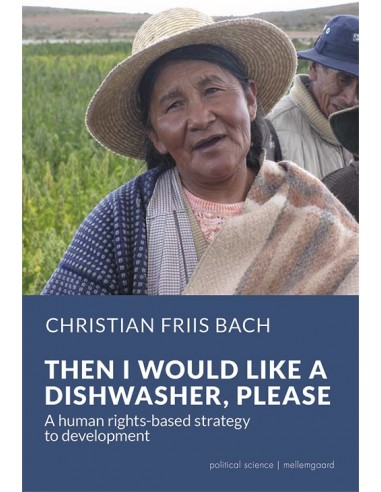Your cart
Es gibt keine Artikel mehr in Ihrem Warenkorb
The international human rights have created monumental changes in the world. They express, more beautifully than anything else, the vision that all citizens deserve a life in dignity, freedom, and security. This vision should be the foundation for both foreign policy, development policy, international cooperation and for day-to-day leadership and management.
Then I would like a dishwasher, please is an academic review and a practitioner’s guide to a human rights-based strategy with stories from places and people from all over the world. It demonstrates how the international human rights can be used not only as goals, but also as an approach based on the human rights principles: Accountability, transparency, participation, and equality. The book argues that a human rights-based strategy can and should be used at all levels and everywhere in both governments, private companies and in civil society organisations.
Excerpt from the book:When we were about to sit down, I pulled out her chair as good manners in our part of the world demands. It visibly made her very confused. She looked slightly embarrassed but then pulled herself together and said loudly: “It is my chair”. When I explained that it was a common Western custom that men hold the chair for ladies at dinner parties, she and the rest of the Afghans laughed loudly. “Here in Afghanistan, men still take the chair from the women,” they said. There are many cultural differences. But she, impressively, stood up for her rights even in front of a Danish minister. It was her chair.
About the author Christian Friis Bach is director of warfair.org, author, and lecturer. He has been Danish Minister for Development Cooperation; UN Under-Secretary-General (UNECE); Secretary-General for the Danish Refugee Council; International Director in DanChurchAid; Chairman of MS/Action Aid; and Associate Professor at the University of Copenhagen (KVL).
Then I would like a dishwasher, please is an academic review and a practitioner’s guide to a human rights-based strategy with stories from places and people from all over the world. It demonstrates how the international human rights can be used not only as goals, but also as an approach based on the human rights principles: Accountability, transparency, participation, and equality. The book argues that a human rights-based strategy can and should be used at all levels and everywhere in both governments, private companies and in civil society organisations.
Excerpt from the book:When we were about to sit down, I pulled out her chair as good manners in our part of the world demands. It visibly made her very confused. She looked slightly embarrassed but then pulled herself together and said loudly: “It is my chair”. When I explained that it was a common Western custom that men hold the chair for ladies at dinner parties, she and the rest of the Afghans laughed loudly. “Here in Afghanistan, men still take the chair from the women,” they said. There are many cultural differences. But she, impressively, stood up for her rights even in front of a Danish minister. It was her chair.
About the author Christian Friis Bach is director of warfair.org, author, and lecturer. He has been Danish Minister for Development Cooperation; UN Under-Secretary-General (UNECE); Secretary-General for the Danish Refugee Council; International Director in DanChurchAid; Chairman of MS/Action Aid; and Associate Professor at the University of Copenhagen (KVL).
- Autor
- Christian Friis Bach
- ISBN13
- 9788772372181
- ISBN10
- 8772372184
- Auflage / Jahr
- 1 / 2020
- Verlag
- Forlaget mellemgaard
- Seitenzahl
- 318
- Bindung
- Hæftet

